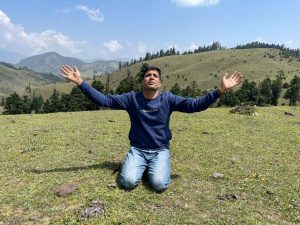 The Supreme Court of Nepal has upheld the decision of the Jumla High Court, affirming Pastor Keshav Acharya’s one-year prison sentence for proselytising.
The Supreme Court of Nepal has upheld the decision of the Jumla High Court, affirming Pastor Keshav Acharya’s one-year prison sentence for proselytising.
Pastor Keshav was arrested on numerous occasions in 2020 on allegations of attempting to convert Hindus to Christianity. On 30 November 2021 the District Court in Dolpa sentenced him to two years in prison, reduced to one year by the Jumla High Court on 13 July 2022. Pastor Keshav appealed the decision to the Supreme Court and was subsequently granted bail pending the Supreme Court decision.
In Pastor Keshav’s appeal he explained that carrying videos and religious materials and sharing them does not undermine the religion of another person and does not necessarily have the intent to convert another person. He also stated in his appeal that criminalising and punishing him for practicing his own religion and following Christian rituals is contrary to the right to religious freedom enshrined in both the constitution and International conventions/contradicts the fundamental rights guaranteed by the Constitution of Nepal, the Universal Declaration of Human Rights 1948, and Article 27 of the International Covenant on Civil and Political Rights.
Nepal’s 2015 constitution states that everyone has the right to practice their religion, but Article 26 (3) states: “No person shall behave, act or make others act to disturb public law and order situation or convert a person of one religion to another or disturb the religion of other people… such an act shall be punished by law.” This article was added to the penal code in 2018, with Section 158 stating that any person who converts, attempts to convert or abets conversion from one religion to another can be sentenced to up to five years’ imprisonment.
However, the court dismissed his logic, raising questions about the compatibility of the Nepalese legal system with the principles of religious freedom. This case highlights the flaws in legal systems that supposedly protect freedom of religion yet have anti-conversion laws.
Reaction
The judgment has deeply affected Pastor Keshav and his family, struggling with the impact of the decision and the fear of his potential arrest and imprisonment. His wife Junu Acharya expressed profound disturbance and heartbreak over the Supreme Court’s decision and said she viewed the legal investigations and legal process as discriminatory and biased.
Pastor Keshav expressed deep sadness about the judgment, reiterating that he is innocent and that his actions were driven by faith and a desire to spread love and blessings. He remains hopeful of a just reconsideration of his case.
Expressing shock at the Supreme Court’s decision, Pastor Keshav’s lawyer, Indra Aryal, emphasised the disregard for grounds presented in the appeal petition, expressed concern that the decision appeared to curtail religious freedom and freedom of expression, particularly for religious minorities.
Joseph Jansen, advocacy officer at Jubilee Campaign Netherlands, stressed that Pastor Keshav Acharya did not coerce individuals to convert to Christianity but was exercising his fundamental right to freedom of religion. He urged Nepalese authorities to respect religious freedom and remove government restrictions related to religion, aligning with human rights norms.
Read Pastor Keshav’s Prisoner Profile.
Approximately 80 percent of Nepal’s population is Hindu, with around 1.3 percent Christian, and converts to Christianity face pressure from family, community and local authorities. Nepal was formerly a Hindu kingdom (it became a secular republic in 2008) and converts are seen as betraying the national religion.
(Jubilee Campaign USA, International Christian Concern, Church in Chains Global Guide)
